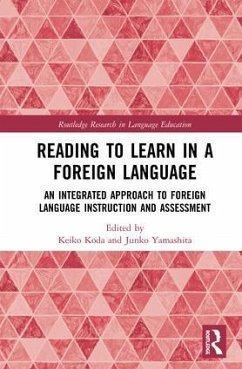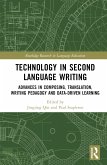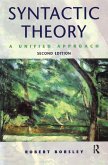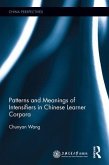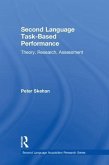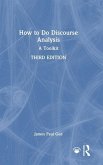Reading to Learn in a Foreign Language
An Integrated Approach to Foreign Language Instruction and Assessment
Herausgeber: Koda, Keiko; Yamashita, Junko
Reading to Learn in a Foreign Language
An Integrated Approach to Foreign Language Instruction and Assessment
Herausgeber: Koda, Keiko; Yamashita, Junko
- Gebundenes Buch
- Merkliste
- Auf die Merkliste
- Bewerten Bewerten
- Teilen
- Produkt teilen
- Produkterinnerung
- Produkterinnerung
This book describes a theory-guided approach to Foreign Language (FL) course development, implementation, instruction and assessment.
Andere Kunden interessierten sich auch für
![Technology in Second Language Writing Technology in Second Language Writing]() Technology in Second Language Writing160,99 €
Technology in Second Language Writing160,99 €![Syntactic Theory Syntactic Theory]() Robert BorsleySyntactic Theory228,99 €
Robert BorsleySyntactic Theory228,99 €![Patterns and Meanings of Intensifiers in Chinese Learner Corpora Patterns and Meanings of Intensifiers in Chinese Learner Corpora]() Chunyan WangPatterns and Meanings of Intensifiers in Chinese Learner Corpora219,99 €
Chunyan WangPatterns and Meanings of Intensifiers in Chinese Learner Corpora219,99 €![An Introduction to Discourse Analysis An Introduction to Discourse Analysis]() James Paul GeeAn Introduction to Discourse Analysis189,99 €
James Paul GeeAn Introduction to Discourse Analysis189,99 €![Second Language Task-Based Performance Second Language Task-Based Performance]() Peter SkehanSecond Language Task-Based Performance187,99 €
Peter SkehanSecond Language Task-Based Performance187,99 €![Pragmatics Pragmatics]() Dawn ArcherPragmatics180,99 €
Dawn ArcherPragmatics180,99 €![How to Do Discourse Analysis How to Do Discourse Analysis]() James Paul GeeHow to Do Discourse Analysis189,99 €
James Paul GeeHow to Do Discourse Analysis189,99 €-
-
-
This book describes a theory-guided approach to Foreign Language (FL) course development, implementation, instruction and assessment.
Hinweis: Dieser Artikel kann nur an eine deutsche Lieferadresse ausgeliefert werden.
Hinweis: Dieser Artikel kann nur an eine deutsche Lieferadresse ausgeliefert werden.
Produktdetails
- Produktdetails
- Verlag: Taylor & Francis Ltd (Sales)
- Seitenzahl: 226
- Erscheinungstermin: 20. August 2018
- Englisch
- Abmessung: 241mm x 162mm x 20mm
- Gewicht: 475g
- ISBN-13: 9781138740990
- ISBN-10: 1138740993
- Artikelnr.: 53772696
- Herstellerkennzeichnung
- Libri GmbH
- Europaallee 1
- 36244 Bad Hersfeld
- gpsr@libri.de
- Verlag: Taylor & Francis Ltd (Sales)
- Seitenzahl: 226
- Erscheinungstermin: 20. August 2018
- Englisch
- Abmessung: 241mm x 162mm x 20mm
- Gewicht: 475g
- ISBN-13: 9781138740990
- ISBN-10: 1138740993
- Artikelnr.: 53772696
- Herstellerkennzeichnung
- Libri GmbH
- Europaallee 1
- 36244 Bad Hersfeld
- gpsr@libri.de
Keiko Koda is Professor of Japanese and Second Language Acquisition in the Department of Modern Languages at Carnegie Mellon University, USA, and Visiting Distinguished Professor for the Japanese Pedagogy MA Program at Columbia University, USA. Junko Yamashita is a Professor in the Department of EFL (English as a Foreign Language) Education at the Graduate School of Humanities, Nagoya University, Japan.
Acknowledgment
List of Contributors
Part I: Theoretical foundations
1. Chapter 1: Introduction (Keiko Koda and Junko Yamashita)
2. Chapter 2: Reading to Learn: Why and how content-based instructional
frameworks facilitate the process (William Grabe and Fredricka L. Stoller)
3. Chapter 3: Integrated communication skills approach: Reading to learn as
a basis for language and content integration (Keiko Koda)
Part II: Fostering reading to learn skills in classrooms
4. Chapter 4: Integrating content as a way of promoting students'
involvement and ownership in skill focused instruction (Junko Yamashita)
5. Chapter 5: Cultivating reading to learn skills in fostering oral
presentation competence as an essential tool for participating in an
increasingly globalized society (Remi Murano)
6. Chapter 6: Challenges for an EFL teacher and basic writers: Negotiating
space for change under a rigid curriculum (Kyoko Baba)
7. Chapter 7: Motivating low-intermediate students to use language skills
for learning and thinking about American society in project-based EFL
instruction (Shingo Ichikawa)
8. Chapter 8: Promoting intrinsic motivation and transcultural competence
through IC skills training (Masumi Kojima)
9. Chapter 9: Enhancing lexical sophistication through IC skills training
in low-intermediate Chinese as a foreign language in the US (Stanley Zhang
and Keiko Koda)
10. Chapter 10: Developing reflective leaners in Chinese as a foreign
language in the US (Sihui (Echo) Ke and Keiko Koda)
Part III Looking ahead
11. Chapter 11: Benefits and challenges of theory-guided approaches to FL
instruction (Junko Yamashita and Keiko Koda)
Index
List of Contributors
Part I: Theoretical foundations
1. Chapter 1: Introduction (Keiko Koda and Junko Yamashita)
2. Chapter 2: Reading to Learn: Why and how content-based instructional
frameworks facilitate the process (William Grabe and Fredricka L. Stoller)
3. Chapter 3: Integrated communication skills approach: Reading to learn as
a basis for language and content integration (Keiko Koda)
Part II: Fostering reading to learn skills in classrooms
4. Chapter 4: Integrating content as a way of promoting students'
involvement and ownership in skill focused instruction (Junko Yamashita)
5. Chapter 5: Cultivating reading to learn skills in fostering oral
presentation competence as an essential tool for participating in an
increasingly globalized society (Remi Murano)
6. Chapter 6: Challenges for an EFL teacher and basic writers: Negotiating
space for change under a rigid curriculum (Kyoko Baba)
7. Chapter 7: Motivating low-intermediate students to use language skills
for learning and thinking about American society in project-based EFL
instruction (Shingo Ichikawa)
8. Chapter 8: Promoting intrinsic motivation and transcultural competence
through IC skills training (Masumi Kojima)
9. Chapter 9: Enhancing lexical sophistication through IC skills training
in low-intermediate Chinese as a foreign language in the US (Stanley Zhang
and Keiko Koda)
10. Chapter 10: Developing reflective leaners in Chinese as a foreign
language in the US (Sihui (Echo) Ke and Keiko Koda)
Part III Looking ahead
11. Chapter 11: Benefits and challenges of theory-guided approaches to FL
instruction (Junko Yamashita and Keiko Koda)
Index
Acknowledgment
List of Contributors
Part I: Theoretical foundations
1. Chapter 1: Introduction (Keiko Koda and Junko Yamashita)
2. Chapter 2: Reading to Learn: Why and how content-based instructional
frameworks facilitate the process (William Grabe and Fredricka L. Stoller)
3. Chapter 3: Integrated communication skills approach: Reading to learn as
a basis for language and content integration (Keiko Koda)
Part II: Fostering reading to learn skills in classrooms
4. Chapter 4: Integrating content as a way of promoting students'
involvement and ownership in skill focused instruction (Junko Yamashita)
5. Chapter 5: Cultivating reading to learn skills in fostering oral
presentation competence as an essential tool for participating in an
increasingly globalized society (Remi Murano)
6. Chapter 6: Challenges for an EFL teacher and basic writers: Negotiating
space for change under a rigid curriculum (Kyoko Baba)
7. Chapter 7: Motivating low-intermediate students to use language skills
for learning and thinking about American society in project-based EFL
instruction (Shingo Ichikawa)
8. Chapter 8: Promoting intrinsic motivation and transcultural competence
through IC skills training (Masumi Kojima)
9. Chapter 9: Enhancing lexical sophistication through IC skills training
in low-intermediate Chinese as a foreign language in the US (Stanley Zhang
and Keiko Koda)
10. Chapter 10: Developing reflective leaners in Chinese as a foreign
language in the US (Sihui (Echo) Ke and Keiko Koda)
Part III Looking ahead
11. Chapter 11: Benefits and challenges of theory-guided approaches to FL
instruction (Junko Yamashita and Keiko Koda)
Index
List of Contributors
Part I: Theoretical foundations
1. Chapter 1: Introduction (Keiko Koda and Junko Yamashita)
2. Chapter 2: Reading to Learn: Why and how content-based instructional
frameworks facilitate the process (William Grabe and Fredricka L. Stoller)
3. Chapter 3: Integrated communication skills approach: Reading to learn as
a basis for language and content integration (Keiko Koda)
Part II: Fostering reading to learn skills in classrooms
4. Chapter 4: Integrating content as a way of promoting students'
involvement and ownership in skill focused instruction (Junko Yamashita)
5. Chapter 5: Cultivating reading to learn skills in fostering oral
presentation competence as an essential tool for participating in an
increasingly globalized society (Remi Murano)
6. Chapter 6: Challenges for an EFL teacher and basic writers: Negotiating
space for change under a rigid curriculum (Kyoko Baba)
7. Chapter 7: Motivating low-intermediate students to use language skills
for learning and thinking about American society in project-based EFL
instruction (Shingo Ichikawa)
8. Chapter 8: Promoting intrinsic motivation and transcultural competence
through IC skills training (Masumi Kojima)
9. Chapter 9: Enhancing lexical sophistication through IC skills training
in low-intermediate Chinese as a foreign language in the US (Stanley Zhang
and Keiko Koda)
10. Chapter 10: Developing reflective leaners in Chinese as a foreign
language in the US (Sihui (Echo) Ke and Keiko Koda)
Part III Looking ahead
11. Chapter 11: Benefits and challenges of theory-guided approaches to FL
instruction (Junko Yamashita and Keiko Koda)
Index

